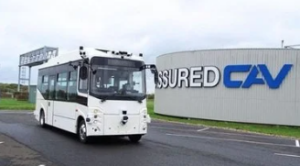The vehicle testing and development centre HORIBA MIRA has voiced its support for Ministry of Defence’s £6.6 billion research and development pledge as a “major boost for UK innovators”.
Responding to the Ministry’s recently published Integrated Review and Defence Command Papers, HORIBA MIRA has called for greater experimentation in defence artificial intelligence (AI) and autonomy pointing to its recently developed VIKING and MERLIN autonomous ground vehicles which it says will be critical to maintaining the UK’s military advantage in the coming years.
Robert Mohacsi, Senior Commercial Manager for Defence Systems at HORIBA MIRA commented, “There is going to be a significant shake up in defence spending and procurement, and we particularly welcome the MoD’s commitment to developing home-grown defence technology, skills and expertise.
“The spending pledged by MoD is a real shot in the arm for UK innovators because it should give the funding needed not just to develop the technology but critically pull it through in to service. At HORIBA MIRA, we’ve been pushing the boundaries of high-technology research in areas including AI for recognition and navigation in the absence of GPS, and autonomy – our platform VIKING is a great example of this; a fully British designed and developed solution to help the defence sector meet complex and demanding challenges.”
Last year HORIBA MIRA secured a major contract to supply VIKING – the first autonomous Unmanned Ground Vehicle of its kind – and now hopes further “buy and try at scale” projects will be offered for extensive trialling and experimentation enabling the acceleration and adoption of rapidly evolving defence technologies such as AI, autonomy and electrification.
The company’s comments come amid an overhaul of the UK’s security and defence policies, initially set out in the Integrated Review of Security, Defence, Development and Foreign Policy earlier this month1, which unveiled the government’s proposals to prioritise technological innovation vital to national security. Meanwhile, the Defence Command Papers, released on 22 March, provide greater detail on what this means for the different defence services2. In addition, a separate defence AI strategy and a Defence Centre for Artificial intelligence is set to be unveiled in the coming months.
(Picture – HORIBA MIRA)






















